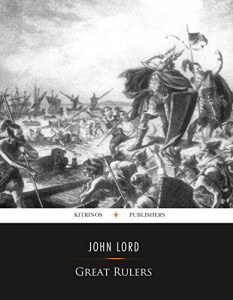Beacon Lights of History, Volume VIII, by John Lord
EXCERPT:
Alfred is one of the most interesting characters in all history for those blended virtues and talents which remind us of a David, a Marcus Aurelius, or a Saint Louis,—a man whom everybody loved, whose deeds were a boon, whose graces were a radiance, and whose words were a benediction; alike a saint, a poet, a warrior, and a statesman. He ruled a little kingdom, but left a great name, second only to Charlemagne, among the civilizers of his people and nation in the Middle Ages. As a man of military genius he yields to many of the kings of England, to say nothing of the heroes of ancient and modern times.
When he was born, A.D. 849, the Saxons had occupied Britain, or England, about four hundred years, having conquered it from the old Celtic inhabitants soon after the Romans had retired to defend their own imperial capital from the Goths. Like the Goths, Vandals, Franks, Burgundians, Lombards, and Heruli, the Saxons belonged to the same Teutonic race, whose remotest origin can be traced to Central Asia,—kindred, indeed, to the early inhabitants of Italy and Greece, whom we call Indo-European, or Aryan. These Saxons—one of the fiercest tribes of the Teutonic barbarians;—lived, before the invasion of Britain, in that part of Europe which we now call Schleswig, in the heart of the peninsula which parts the Baltic from the northern seas; also in those parts of Germany which now belong to Hanover and Oldenburg. It does not appear from the best authorities that these tribes—called Engle, Saxon, and Jute—wandered about seeking a precarious living, but they were settled in villages, in the government of which we trace the germs of the subsequent social and political institutions of England. The social centre was the homestead of the oetheling or corl, distinguished from his fellow-villagers by his greater wealth and nobler blood, and held by them in hereditary reverence. From him and his brother-oethelings the leaders of a warlike expedition were chosen. He alone was armed with spear and sword, and his long hair floated in the wind. He was bound to protect his kinsmen from wrong and injustice. The land which inclosed the village, whether reserved for pasture, wood, or tillage, was undivided, and every free villager had the right of turning his cattle and swine upon it, and also of sharing in the division of the harvest. The basis of the life was agricultural. Our Saxon ancestors in Germany did not subsist exclusively by hunting or fishing, although these pursuits were not neglected. They were as skilful with the plough and mattock as they were in steering a boat or hunting a deer or pursuing a whale. They were coarse in their pleasures, but religious in their turn of mind; Pagans, indeed, but worshipping the powers of Nature with poetic ardor. They were born warriors, and their passion for the sea led to adventurous enterprise. Before the close of the third century their boats, driven by fifty oars, had been seen in the British waters; and after the Romans had left the Britons to defend themselves against the Scots and Picts, the harassed rulers of the land invoked the aid of these Saxon pirates, and, headed by two ealdormen,—Hengist and Horsa,—they landed on the Isle of Thanet in the year 449.






